Analyzing Data Collection: Ethical Theories & Online Personalities
VerifiedAdded on 2023/06/08
|8
|2005
|434
Case Study
AI Summary
This case study delves into the ethical implications of collecting and utilizing online personality data, specifically focusing on Cambridge Analytica's methods. It examines the ethical issues related to data protection, extrapolation, and the fairness of data creation. The analysis applies classical ethical theories, including utilitarianism, deontology, contract theory, and virtue ethics, to evaluate the morality of harvesting personal information online. The case study identifies affected parties, such as questionnaire respondents and data companies, and discusses the challenges of balancing data utility with individual privacy rights. Ultimately, it argues that utilitarianism best explains the case, highlighting the need for evolving data protection rules to address the speed and capabilities of modern data mining techniques. Desklib provides this and other solved assignments for students.
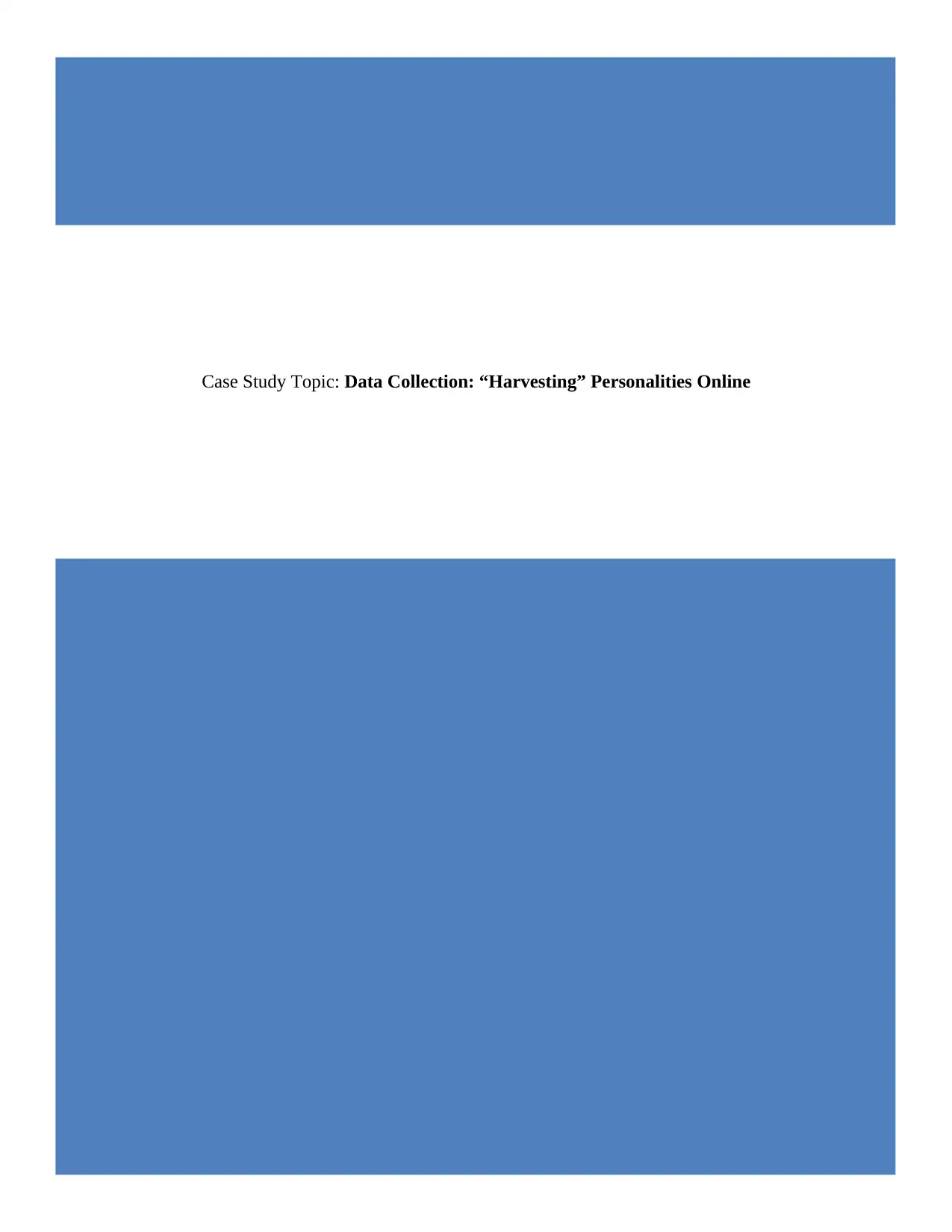
Case Study Topic: Data Collection: “Harvesting” Personalities Online
Paraphrase This Document
Need a fresh take? Get an instant paraphrase of this document with our AI Paraphraser
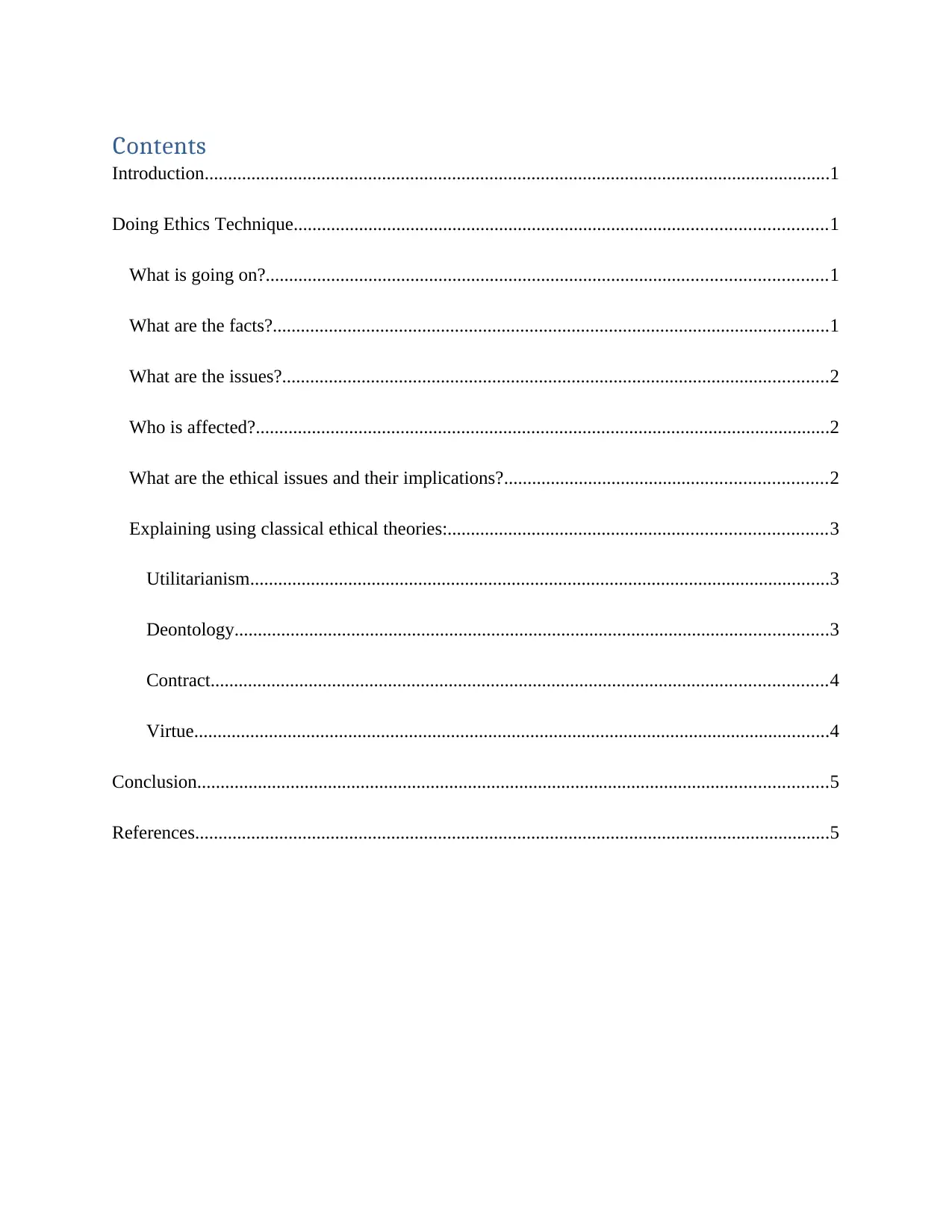
Contents
Introduction......................................................................................................................................1
Doing Ethics Technique..................................................................................................................1
What is going on?........................................................................................................................1
What are the facts?.......................................................................................................................1
What are the issues?.....................................................................................................................2
Who is affected?...........................................................................................................................2
What are the ethical issues and their implications?.....................................................................2
Explaining using classical ethical theories:.................................................................................3
Utilitarianism............................................................................................................................3
Deontology...............................................................................................................................3
Contract....................................................................................................................................4
Virtue........................................................................................................................................4
Conclusion.......................................................................................................................................5
References........................................................................................................................................5
Introduction......................................................................................................................................1
Doing Ethics Technique..................................................................................................................1
What is going on?........................................................................................................................1
What are the facts?.......................................................................................................................1
What are the issues?.....................................................................................................................2
Who is affected?...........................................................................................................................2
What are the ethical issues and their implications?.....................................................................2
Explaining using classical ethical theories:.................................................................................3
Utilitarianism............................................................................................................................3
Deontology...............................................................................................................................3
Contract....................................................................................................................................4
Virtue........................................................................................................................................4
Conclusion.......................................................................................................................................5
References........................................................................................................................................5
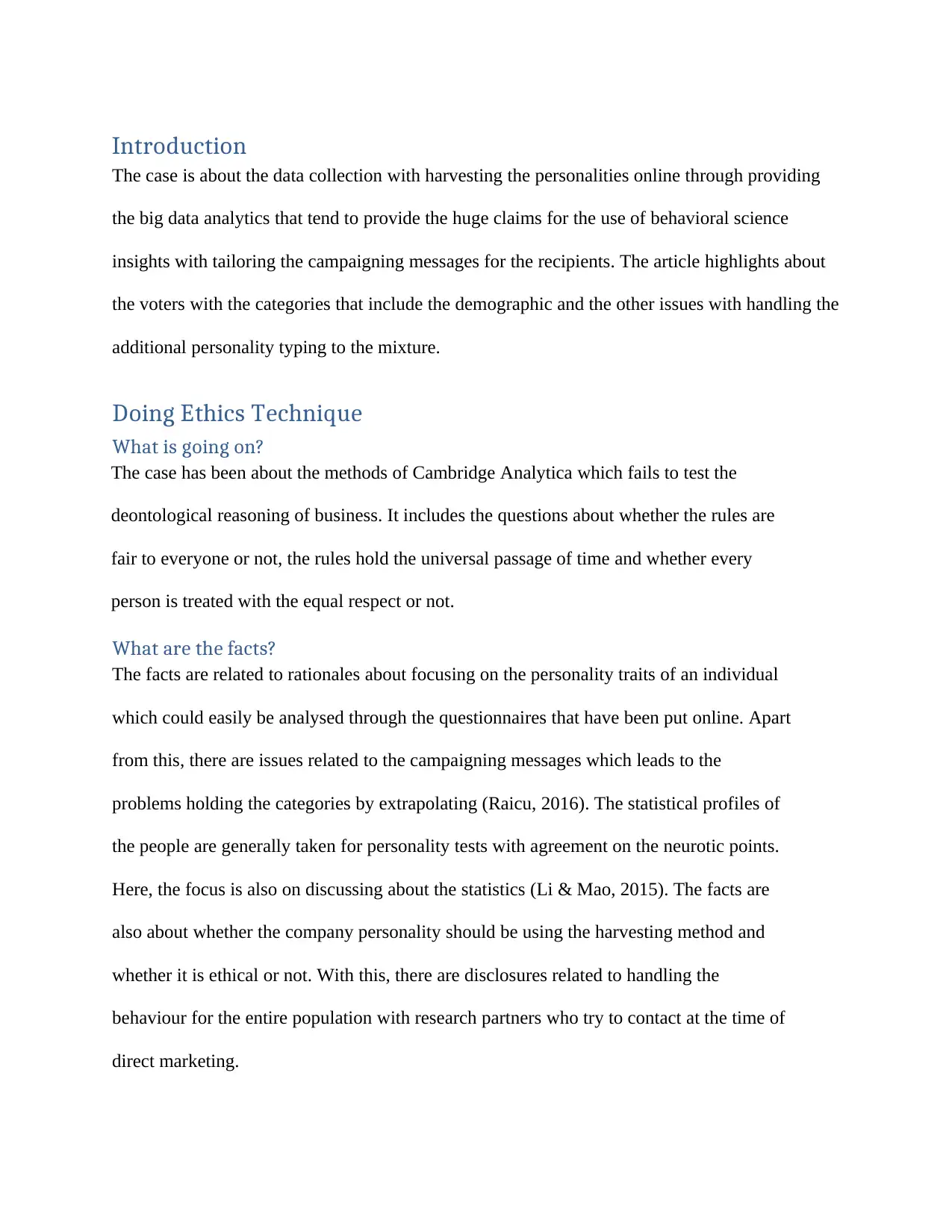
Introduction
The case is about the data collection with harvesting the personalities online through providing
the big data analytics that tend to provide the huge claims for the use of behavioral science
insights with tailoring the campaigning messages for the recipients. The article highlights about
the voters with the categories that include the demographic and the other issues with handling the
additional personality typing to the mixture.
Doing Ethics Technique
What is going on?
The case has been about the methods of Cambridge Analytica which fails to test the
deontological reasoning of business. It includes the questions about whether the rules are
fair to everyone or not, the rules hold the universal passage of time and whether every
person is treated with the equal respect or not.
What are the facts?
The facts are related to rationales about focusing on the personality traits of an individual
which could easily be analysed through the questionnaires that have been put online. Apart
from this, there are issues related to the campaigning messages which leads to the
problems holding the categories by extrapolating (Raicu, 2016). The statistical profiles of
the people are generally taken for personality tests with agreement on the neurotic points.
Here, the focus is also on discussing about the statistics (Li & Mao, 2015). The facts are
also about whether the company personality should be using the harvesting method and
whether it is ethical or not. With this, there are disclosures related to handling the
behaviour for the entire population with research partners who try to contact at the time of
direct marketing.
The case is about the data collection with harvesting the personalities online through providing
the big data analytics that tend to provide the huge claims for the use of behavioral science
insights with tailoring the campaigning messages for the recipients. The article highlights about
the voters with the categories that include the demographic and the other issues with handling the
additional personality typing to the mixture.
Doing Ethics Technique
What is going on?
The case has been about the methods of Cambridge Analytica which fails to test the
deontological reasoning of business. It includes the questions about whether the rules are
fair to everyone or not, the rules hold the universal passage of time and whether every
person is treated with the equal respect or not.
What are the facts?
The facts are related to rationales about focusing on the personality traits of an individual
which could easily be analysed through the questionnaires that have been put online. Apart
from this, there are issues related to the campaigning messages which leads to the
problems holding the categories by extrapolating (Raicu, 2016). The statistical profiles of
the people are generally taken for personality tests with agreement on the neurotic points.
Here, the focus is also on discussing about the statistics (Li & Mao, 2015). The facts are
also about whether the company personality should be using the harvesting method and
whether it is ethical or not. With this, there are disclosures related to handling the
behaviour for the entire population with research partners who try to contact at the time of
direct marketing.
⊘ This is a preview!⊘
Do you want full access?
Subscribe today to unlock all pages.

Trusted by 1+ million students worldwide
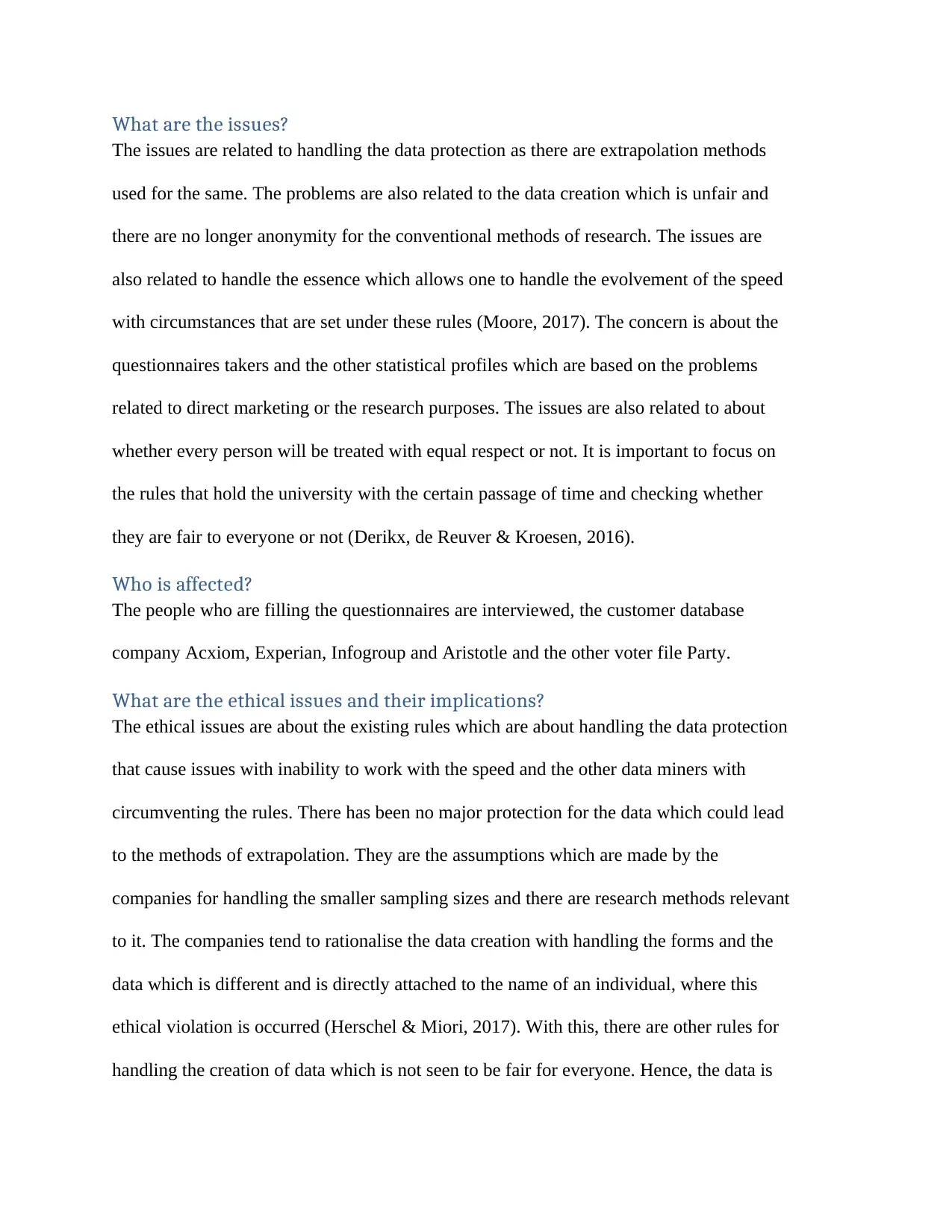
What are the issues?
The issues are related to handling the data protection as there are extrapolation methods
used for the same. The problems are also related to the data creation which is unfair and
there are no longer anonymity for the conventional methods of research. The issues are
also related to handle the essence which allows one to handle the evolvement of the speed
with circumstances that are set under these rules (Moore, 2017). The concern is about the
questionnaires takers and the other statistical profiles which are based on the problems
related to direct marketing or the research purposes. The issues are also related to about
whether every person will be treated with equal respect or not. It is important to focus on
the rules that hold the university with the certain passage of time and checking whether
they are fair to everyone or not (Derikx, de Reuver & Kroesen, 2016).
Who is affected?
The people who are filling the questionnaires are interviewed, the customer database
company Acxiom, Experian, Infogroup and Aristotle and the other voter file Party.
What are the ethical issues and their implications?
The ethical issues are about the existing rules which are about handling the data protection
that cause issues with inability to work with the speed and the other data miners with
circumventing the rules. There has been no major protection for the data which could lead
to the methods of extrapolation. They are the assumptions which are made by the
companies for handling the smaller sampling sizes and there are research methods relevant
to it. The companies tend to rationalise the data creation with handling the forms and the
data which is different and is directly attached to the name of an individual, where this
ethical violation is occurred (Herschel & Miori, 2017). With this, there are other rules for
handling the creation of data which is not seen to be fair for everyone. Hence, the data is
The issues are related to handling the data protection as there are extrapolation methods
used for the same. The problems are also related to the data creation which is unfair and
there are no longer anonymity for the conventional methods of research. The issues are
also related to handle the essence which allows one to handle the evolvement of the speed
with circumstances that are set under these rules (Moore, 2017). The concern is about the
questionnaires takers and the other statistical profiles which are based on the problems
related to direct marketing or the research purposes. The issues are also related to about
whether every person will be treated with equal respect or not. It is important to focus on
the rules that hold the university with the certain passage of time and checking whether
they are fair to everyone or not (Derikx, de Reuver & Kroesen, 2016).
Who is affected?
The people who are filling the questionnaires are interviewed, the customer database
company Acxiom, Experian, Infogroup and Aristotle and the other voter file Party.
What are the ethical issues and their implications?
The ethical issues are about the existing rules which are about handling the data protection
that cause issues with inability to work with the speed and the other data miners with
circumventing the rules. There has been no major protection for the data which could lead
to the methods of extrapolation. They are the assumptions which are made by the
companies for handling the smaller sampling sizes and there are research methods relevant
to it. The companies tend to rationalise the data creation with handling the forms and the
data which is different and is directly attached to the name of an individual, where this
ethical violation is occurred (Herschel & Miori, 2017). With this, there are other rules for
handling the creation of data which is not seen to be fair for everyone. Hence, the data is
Paraphrase This Document
Need a fresh take? Get an instant paraphrase of this document with our AI Paraphraser
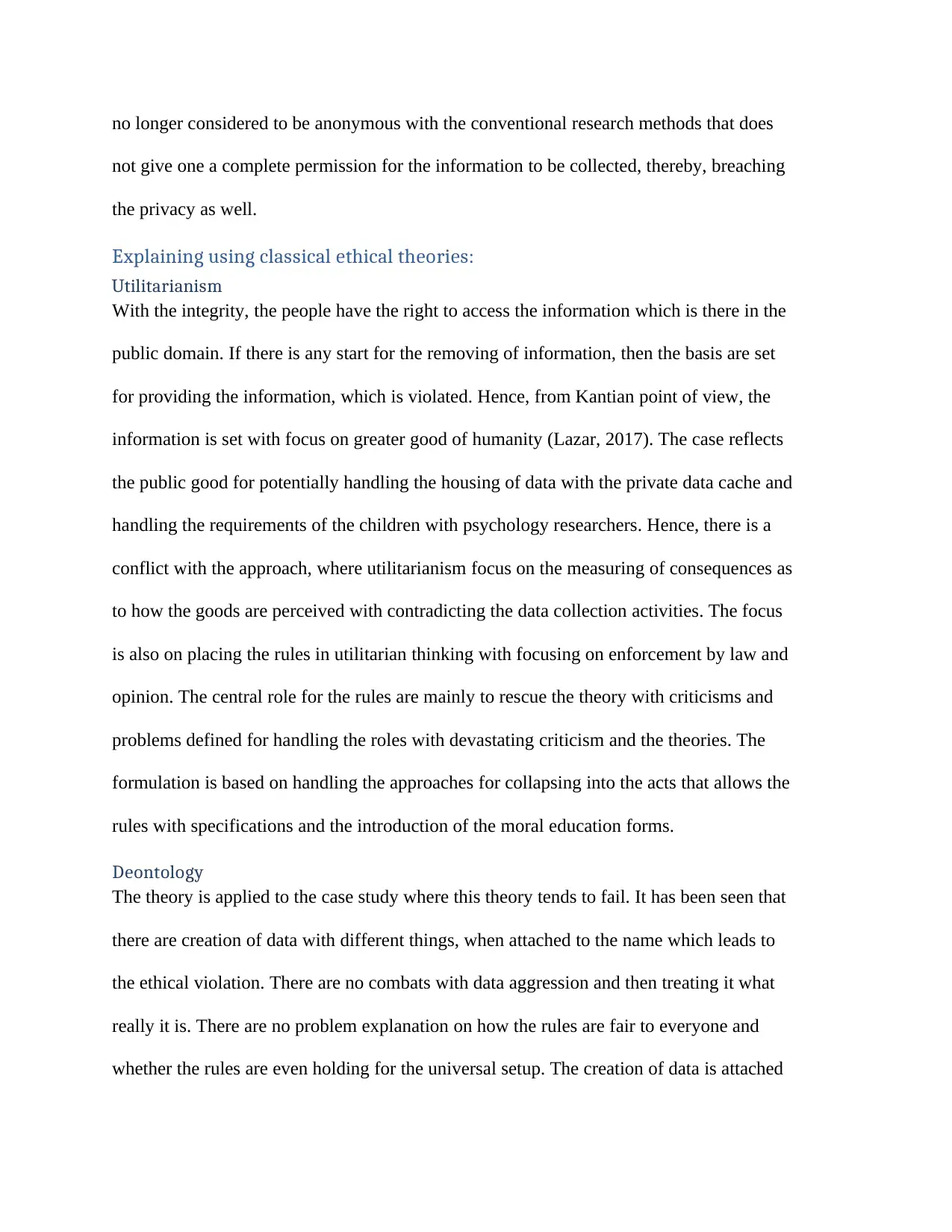
no longer considered to be anonymous with the conventional research methods that does
not give one a complete permission for the information to be collected, thereby, breaching
the privacy as well.
Explaining using classical ethical theories:
Utilitarianism
With the integrity, the people have the right to access the information which is there in the
public domain. If there is any start for the removing of information, then the basis are set
for providing the information, which is violated. Hence, from Kantian point of view, the
information is set with focus on greater good of humanity (Lazar, 2017). The case reflects
the public good for potentially handling the housing of data with the private data cache and
handling the requirements of the children with psychology researchers. Hence, there is a
conflict with the approach, where utilitarianism focus on the measuring of consequences as
to how the goods are perceived with contradicting the data collection activities. The focus
is also on placing the rules in utilitarian thinking with focusing on enforcement by law and
opinion. The central role for the rules are mainly to rescue the theory with criticisms and
problems defined for handling the roles with devastating criticism and the theories. The
formulation is based on handling the approaches for collapsing into the acts that allows the
rules with specifications and the introduction of the moral education forms.
Deontology
The theory is applied to the case study where this theory tends to fail. It has been seen that
there are creation of data with different things, when attached to the name which leads to
the ethical violation. There are no combats with data aggression and then treating it what
really it is. There are no problem explanation on how the rules are fair to everyone and
whether the rules are even holding for the universal setup. The creation of data is attached
not give one a complete permission for the information to be collected, thereby, breaching
the privacy as well.
Explaining using classical ethical theories:
Utilitarianism
With the integrity, the people have the right to access the information which is there in the
public domain. If there is any start for the removing of information, then the basis are set
for providing the information, which is violated. Hence, from Kantian point of view, the
information is set with focus on greater good of humanity (Lazar, 2017). The case reflects
the public good for potentially handling the housing of data with the private data cache and
handling the requirements of the children with psychology researchers. Hence, there is a
conflict with the approach, where utilitarianism focus on the measuring of consequences as
to how the goods are perceived with contradicting the data collection activities. The focus
is also on placing the rules in utilitarian thinking with focusing on enforcement by law and
opinion. The central role for the rules are mainly to rescue the theory with criticisms and
problems defined for handling the roles with devastating criticism and the theories. The
formulation is based on handling the approaches for collapsing into the acts that allows the
rules with specifications and the introduction of the moral education forms.
Deontology
The theory is applied to the case study where this theory tends to fail. It has been seen that
there are creation of data with different things, when attached to the name which leads to
the ethical violation. There are no combats with data aggression and then treating it what
really it is. There are no problem explanation on how the rules are fair to everyone and
whether the rules are even holding for the universal setup. The creation of data is attached
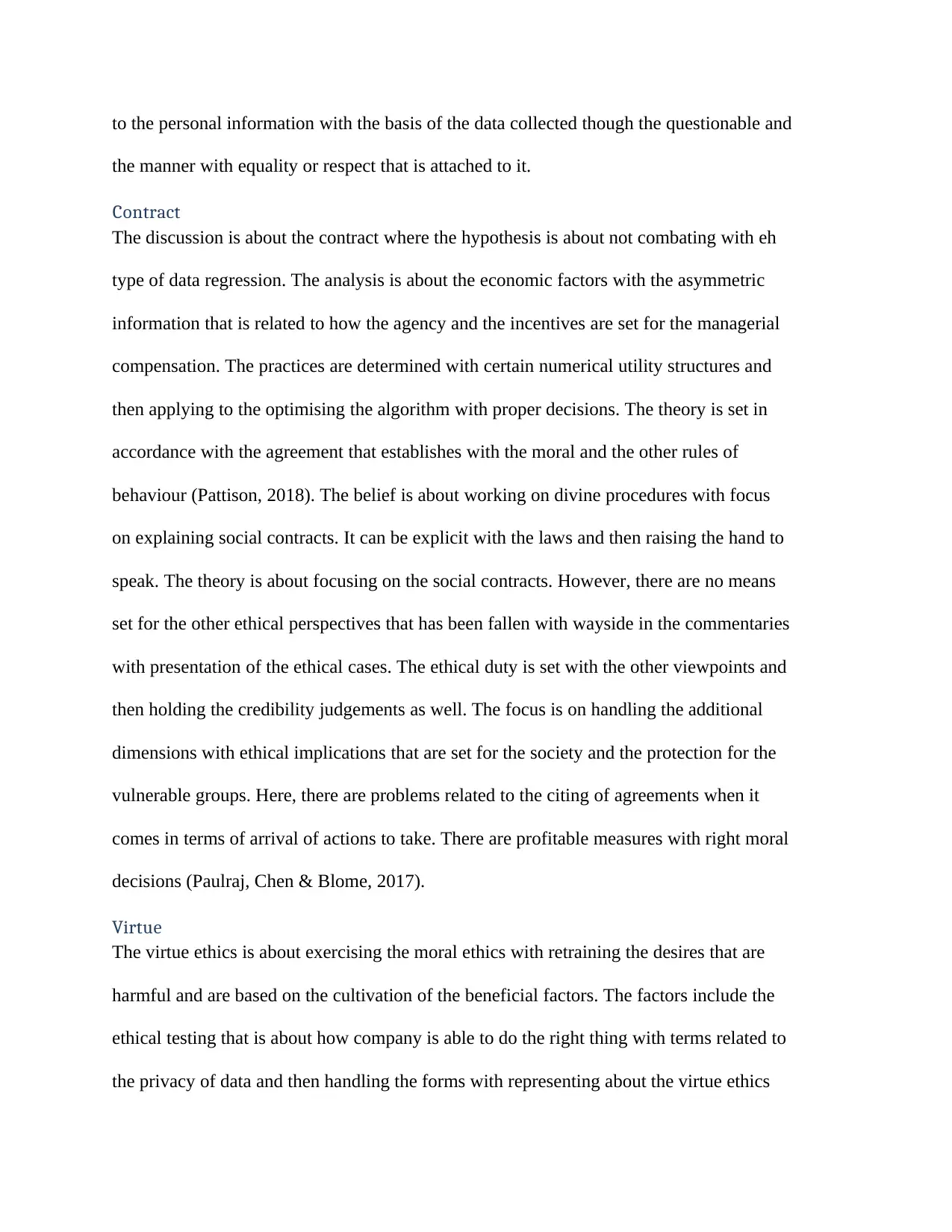
to the personal information with the basis of the data collected though the questionable and
the manner with equality or respect that is attached to it.
Contract
The discussion is about the contract where the hypothesis is about not combating with eh
type of data regression. The analysis is about the economic factors with the asymmetric
information that is related to how the agency and the incentives are set for the managerial
compensation. The practices are determined with certain numerical utility structures and
then applying to the optimising the algorithm with proper decisions. The theory is set in
accordance with the agreement that establishes with the moral and the other rules of
behaviour (Pattison, 2018). The belief is about working on divine procedures with focus
on explaining social contracts. It can be explicit with the laws and then raising the hand to
speak. The theory is about focusing on the social contracts. However, there are no means
set for the other ethical perspectives that has been fallen with wayside in the commentaries
with presentation of the ethical cases. The ethical duty is set with the other viewpoints and
then holding the credibility judgements as well. The focus is on handling the additional
dimensions with ethical implications that are set for the society and the protection for the
vulnerable groups. Here, there are problems related to the citing of agreements when it
comes in terms of arrival of actions to take. There are profitable measures with right moral
decisions (Paulraj, Chen & Blome, 2017).
Virtue
The virtue ethics is about exercising the moral ethics with retraining the desires that are
harmful and are based on the cultivation of the beneficial factors. The factors include the
ethical testing that is about how company is able to do the right thing with terms related to
the privacy of data and then handling the forms with representing about the virtue ethics
the manner with equality or respect that is attached to it.
Contract
The discussion is about the contract where the hypothesis is about not combating with eh
type of data regression. The analysis is about the economic factors with the asymmetric
information that is related to how the agency and the incentives are set for the managerial
compensation. The practices are determined with certain numerical utility structures and
then applying to the optimising the algorithm with proper decisions. The theory is set in
accordance with the agreement that establishes with the moral and the other rules of
behaviour (Pattison, 2018). The belief is about working on divine procedures with focus
on explaining social contracts. It can be explicit with the laws and then raising the hand to
speak. The theory is about focusing on the social contracts. However, there are no means
set for the other ethical perspectives that has been fallen with wayside in the commentaries
with presentation of the ethical cases. The ethical duty is set with the other viewpoints and
then holding the credibility judgements as well. The focus is on handling the additional
dimensions with ethical implications that are set for the society and the protection for the
vulnerable groups. Here, there are problems related to the citing of agreements when it
comes in terms of arrival of actions to take. There are profitable measures with right moral
decisions (Paulraj, Chen & Blome, 2017).
Virtue
The virtue ethics is about exercising the moral ethics with retraining the desires that are
harmful and are based on the cultivation of the beneficial factors. The factors include the
ethical testing that is about how company is able to do the right thing with terms related to
the privacy of data and then handling the forms with representing about the virtue ethics
⊘ This is a preview!⊘
Do you want full access?
Subscribe today to unlock all pages.

Trusted by 1+ million students worldwide
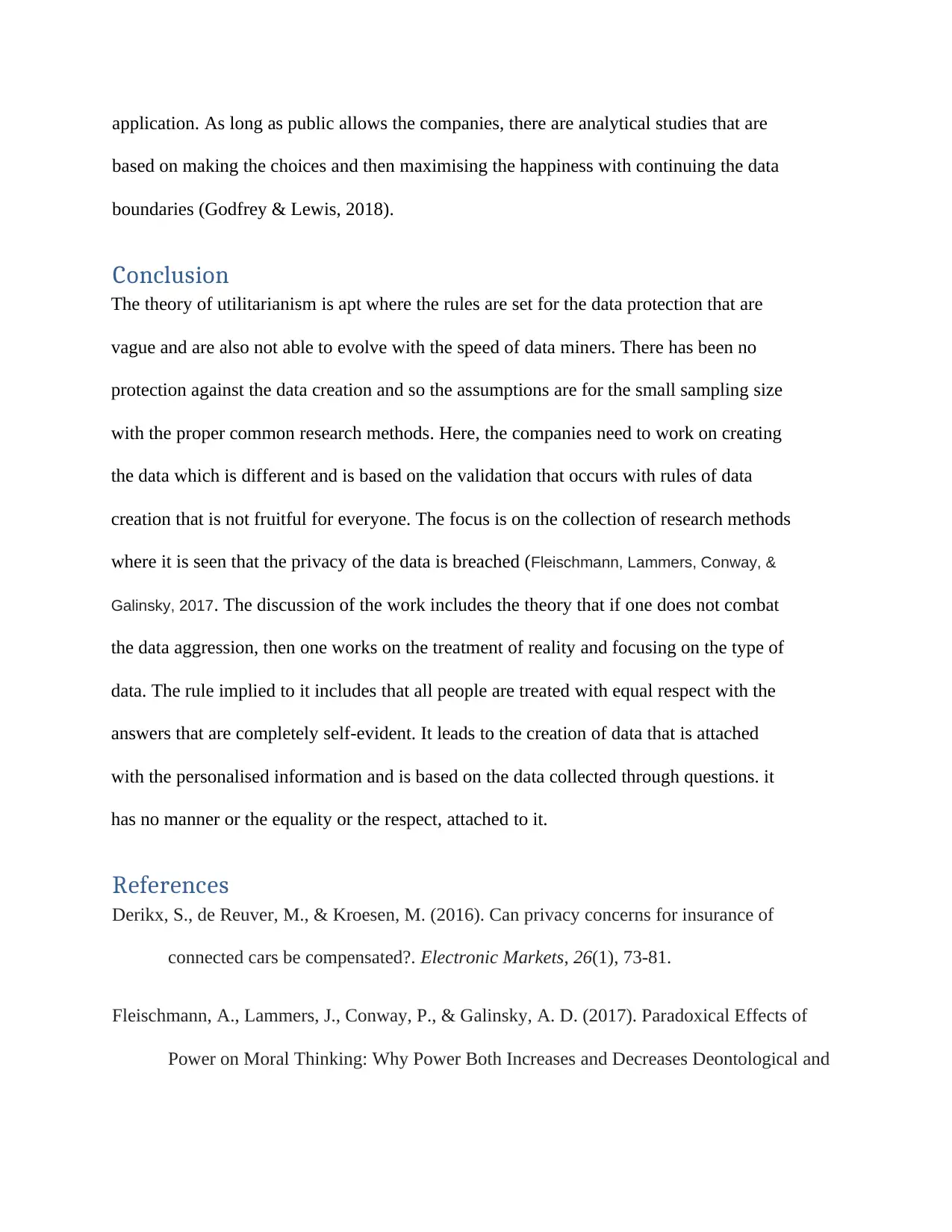
application. As long as public allows the companies, there are analytical studies that are
based on making the choices and then maximising the happiness with continuing the data
boundaries (Godfrey & Lewis, 2018).
Conclusion
The theory of utilitarianism is apt where the rules are set for the data protection that are
vague and are also not able to evolve with the speed of data miners. There has been no
protection against the data creation and so the assumptions are for the small sampling size
with the proper common research methods. Here, the companies need to work on creating
the data which is different and is based on the validation that occurs with rules of data
creation that is not fruitful for everyone. The focus is on the collection of research methods
where it is seen that the privacy of the data is breached (Fleischmann, Lammers, Conway, &
Galinsky, 2017. The discussion of the work includes the theory that if one does not combat
the data aggression, then one works on the treatment of reality and focusing on the type of
data. The rule implied to it includes that all people are treated with equal respect with the
answers that are completely self-evident. It leads to the creation of data that is attached
with the personalised information and is based on the data collected through questions. it
has no manner or the equality or the respect, attached to it.
References
Derikx, S., de Reuver, M., & Kroesen, M. (2016). Can privacy concerns for insurance of
connected cars be compensated?. Electronic Markets, 26(1), 73-81.
Fleischmann, A., Lammers, J., Conway, P., & Galinsky, A. D. (2017). Paradoxical Effects of
Power on Moral Thinking: Why Power Both Increases and Decreases Deontological and
based on making the choices and then maximising the happiness with continuing the data
boundaries (Godfrey & Lewis, 2018).
Conclusion
The theory of utilitarianism is apt where the rules are set for the data protection that are
vague and are also not able to evolve with the speed of data miners. There has been no
protection against the data creation and so the assumptions are for the small sampling size
with the proper common research methods. Here, the companies need to work on creating
the data which is different and is based on the validation that occurs with rules of data
creation that is not fruitful for everyone. The focus is on the collection of research methods
where it is seen that the privacy of the data is breached (Fleischmann, Lammers, Conway, &
Galinsky, 2017. The discussion of the work includes the theory that if one does not combat
the data aggression, then one works on the treatment of reality and focusing on the type of
data. The rule implied to it includes that all people are treated with equal respect with the
answers that are completely self-evident. It leads to the creation of data that is attached
with the personalised information and is based on the data collected through questions. it
has no manner or the equality or the respect, attached to it.
References
Derikx, S., de Reuver, M., & Kroesen, M. (2016). Can privacy concerns for insurance of
connected cars be compensated?. Electronic Markets, 26(1), 73-81.
Fleischmann, A., Lammers, J., Conway, P., & Galinsky, A. D. (2017). Paradoxical Effects of
Power on Moral Thinking: Why Power Both Increases and Decreases Deontological and
Paraphrase This Document
Need a fresh take? Get an instant paraphrase of this document with our AI Paraphraser
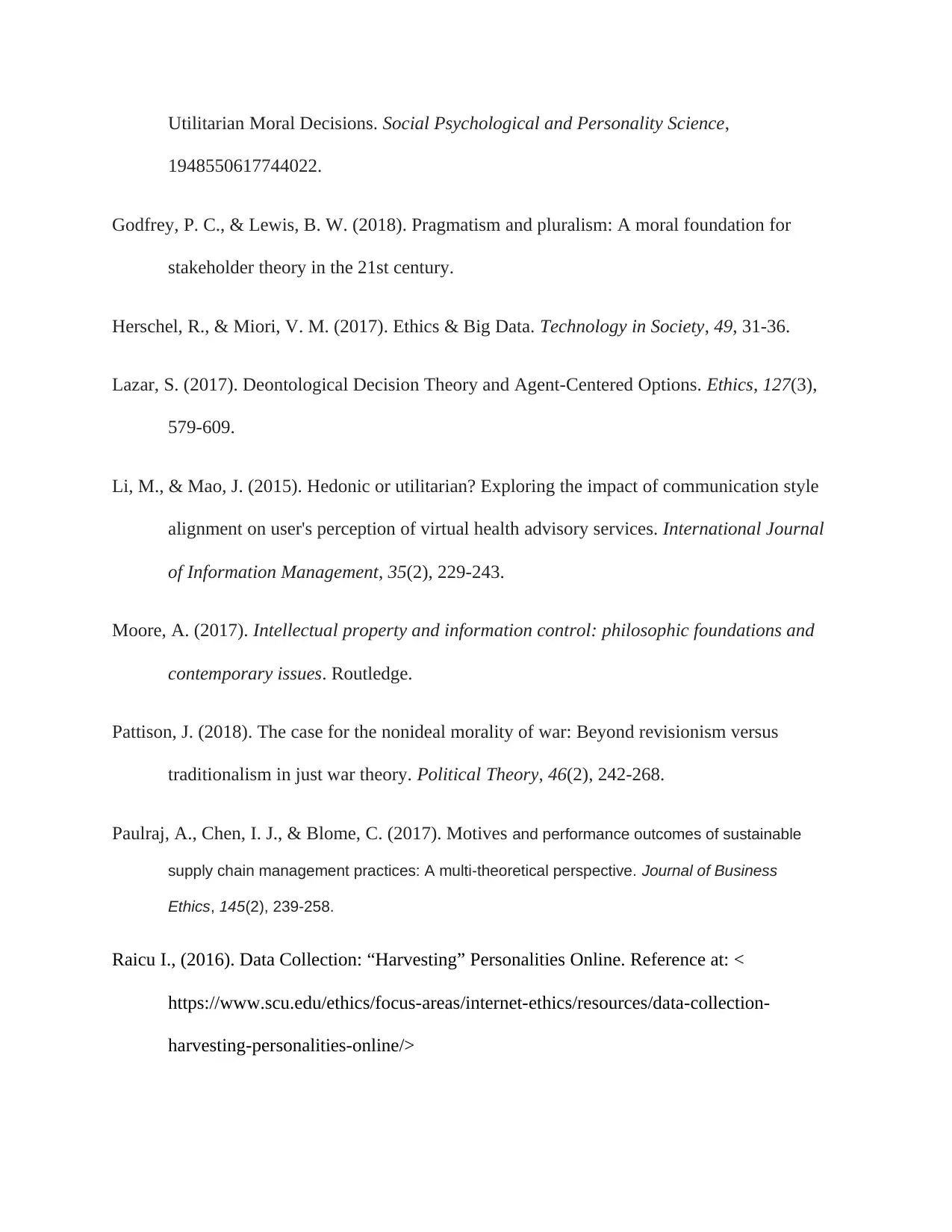
Utilitarian Moral Decisions. Social Psychological and Personality Science,
1948550617744022.
Godfrey, P. C., & Lewis, B. W. (2018). Pragmatism and pluralism: A moral foundation for
stakeholder theory in the 21st century.
Herschel, R., & Miori, V. M. (2017). Ethics & Big Data. Technology in Society, 49, 31-36.
Lazar, S. (2017). Deontological Decision Theory and Agent-Centered Options. Ethics, 127(3),
579-609.
Li, M., & Mao, J. (2015). Hedonic or utilitarian? Exploring the impact of communication style
alignment on user's perception of virtual health advisory services. International Journal
of Information Management, 35(2), 229-243.
Moore, A. (2017). Intellectual property and information control: philosophic foundations and
contemporary issues. Routledge.
Pattison, J. (2018). The case for the nonideal morality of war: Beyond revisionism versus
traditionalism in just war theory. Political Theory, 46(2), 242-268.
Paulraj, A., Chen, I. J., & Blome, C. (2017). Motives and performance outcomes of sustainable
supply chain management practices: A multi-theoretical perspective. Journal of Business
Ethics, 145(2), 239-258.
Raicu I., (2016). Data Collection: “Harvesting” Personalities Online. Reference at: <
https://www.scu.edu/ethics/focus-areas/internet-ethics/resources/data-collection-
harvesting-personalities-online/>
1948550617744022.
Godfrey, P. C., & Lewis, B. W. (2018). Pragmatism and pluralism: A moral foundation for
stakeholder theory in the 21st century.
Herschel, R., & Miori, V. M. (2017). Ethics & Big Data. Technology in Society, 49, 31-36.
Lazar, S. (2017). Deontological Decision Theory and Agent-Centered Options. Ethics, 127(3),
579-609.
Li, M., & Mao, J. (2015). Hedonic or utilitarian? Exploring the impact of communication style
alignment on user's perception of virtual health advisory services. International Journal
of Information Management, 35(2), 229-243.
Moore, A. (2017). Intellectual property and information control: philosophic foundations and
contemporary issues. Routledge.
Pattison, J. (2018). The case for the nonideal morality of war: Beyond revisionism versus
traditionalism in just war theory. Political Theory, 46(2), 242-268.
Paulraj, A., Chen, I. J., & Blome, C. (2017). Motives and performance outcomes of sustainable
supply chain management practices: A multi-theoretical perspective. Journal of Business
Ethics, 145(2), 239-258.
Raicu I., (2016). Data Collection: “Harvesting” Personalities Online. Reference at: <
https://www.scu.edu/ethics/focus-areas/internet-ethics/resources/data-collection-
harvesting-personalities-online/>
1 out of 8
Related Documents
Your All-in-One AI-Powered Toolkit for Academic Success.
+13062052269
info@desklib.com
Available 24*7 on WhatsApp / Email
![[object Object]](/_next/static/media/star-bottom.7253800d.svg)
Unlock your academic potential
Copyright © 2020–2026 A2Z Services. All Rights Reserved. Developed and managed by ZUCOL.



